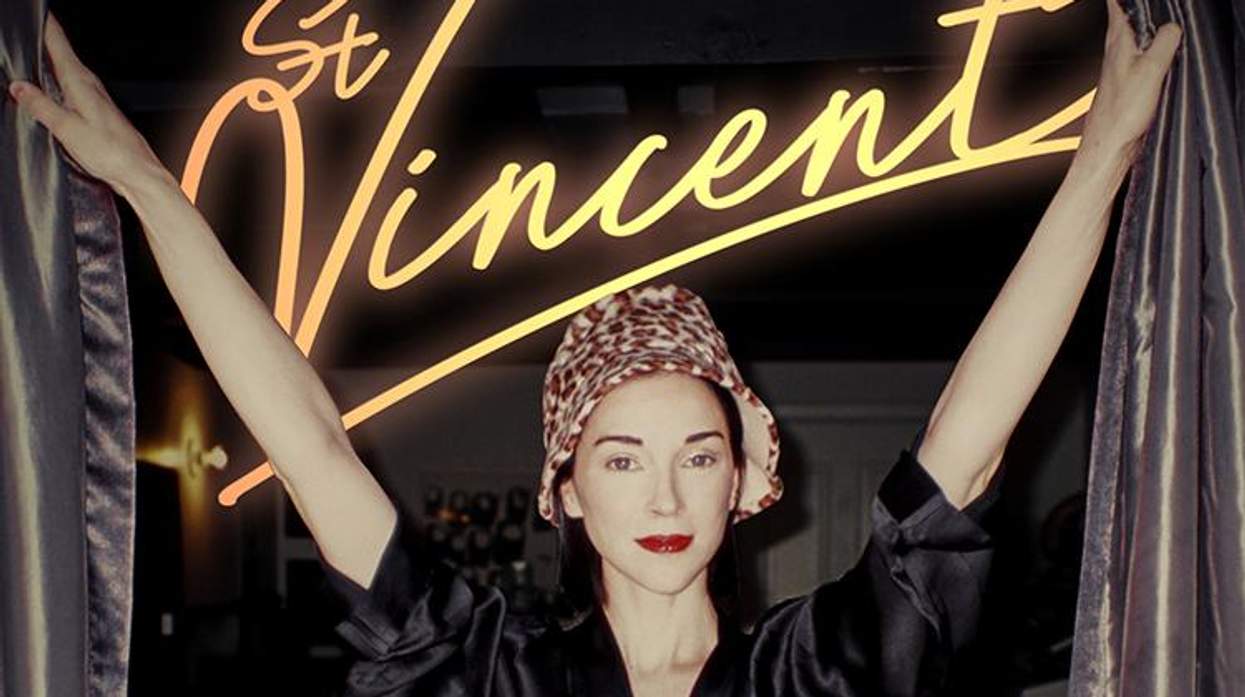When St. Vincent performs, there's not a lot of banter and oversharing of inspiration for her songs between numbers. Which is, in part, why the Audible Original St. Vincent Words + Music is such a highly entertaining, exquisite gift from the performer who delves into her catalog while regaling the listener with stories peppered with self-reflexive bons mots.
"For a long time, I stayed away from giving people the literal facts of my life because I just wanted us to meet at the music," Annie Clark, known as her enigmatic stage persona St. Vincent, tells The Advocate. "Once you've made a thing it's for other people now, it's not really about you anymore."
"I think when I listen to music and I'm really just obsessed with a song or really connected to something, I think I don't really care what it was about for the singer or the writer. Because I'm just so engrossed in my own experience of it that that's not a huge part of the experience for me," Clark adds. "I kind of shied away from being too overtly autobiographical in my interviews."
With six studio albums to her name, including 2012's Love This Giant with David Byrne, Clark has toured endlessly at times, but she says she's not much the storytelling type between songs, save for a handful of shows she performed with a friend, pianist Thomas Bartlett, in 2018.
"There was a lot of talking in that. I think more because of the kind of space and the kind of show that it was. You're not in front of a festival crowd of thousands and thousands of people trying to make sure that you keep people hyped. You're in a more intimate place, where you can do your fucked-up Judy Garland thing," Clark says.
The Audible project runs about 90 minutes and includes nine stirring new versions of tentpole songs from Clark's life and career that were recorded in her home studio. Her thoughtful, perspicacious, and deeply funny repartee draws the listener instantly into her world.
For instance, following "New York," from Masseducation, Clark, who grew up in Texas, shares about her relationship with her adopted city.
"I was living in the East Village at the time, and I'm thinking of Arthur Russell [a musician and composer], who lived just down the way," Clark says in the piece.
"I read Just Kids [Patti Smith's memoir]. I'm thinking about Patti Smith and Robert Mapplethorpe running around Tompkins [Square Park]," Clark says. "It's such a city full of epic ghosts and also your own personal past and your own personal ghosts. There's so much history in one block in New York."

St. Vincent Performs "Let's Go Crazy" for a Prince Tribute
St. Vincent dominated the stage at the 2019 Grammy Awards with a fiery, very queer performance of "One Kiss," with Clark in latex and thigh-highs commanding her guitar. The act featured Dua Lipa as her doppelganger. But Clark, who was with Polyphonic Spree for a time before she released her first solo album, Marry Me, as St. Vincent in 2007, has long been on the radar of alt-music fans and queer folks, for whom her combination of artistry, quirk, and wit resonate.
While she admittedly remains somewhat opaque about the meaning of her songs once they're out in the world, allowing her audience to imprint on them in their own way, regarding sharing her stories via the Audible Original venue, she says, "It made perfect sense to me...."
"It was a chance to go back through my catalog and pick out certain songs that I felt could be tent posts to tell an evolution story and get to reinvent probably eight or nine songs -- just new versions of older material," she says.
"I don't go back and listen to the old records. Only in the sense that I'll try to make sure that I'm not doing any self-plagiarizing or getting stale. I'll mentally check references, but I don't spend time thinking about old work."
"I have enough distance from certain things that it was a nice way to let people in a bit more. And say, 'Hopefully this won't ruin your experience of the song. Or whatever it means to you. But here's more the context of what was going on in my life at the time.'"
Between her Audible Original and as the subject of the meta-mockumentary The Nowhere Inn with her friend Carrie Brownstein (directed by Bill Benz) that just played at Outfest's Drive-in venue in Malibu, Calif., Clark has recently confronted her celebrity in a couple of ways. While The Nowhere Inn is a postmodern deconstruction of her public versus private personas, her Audible piece is "really sincere."
"I don't really pull any punches," she says of St. Vincent Words + Music. "And for the longest time, I thought 'pull any punches' meant that you don't throw a punch. But it means that you don't stop yourself from throwing a hard punch. So I don't really pull any punches."
"I need to make everything a violent metaphor or it just doesn't make sense," she says wryly.
The stories that orbit around her re-recorded tracks include "Champagne Year." For that she shares that it was a response to her family coping with her father having gone to prison for a "white-collar crime." For "Digital Witness," she dives into the weird space of being a public persona that is then expected to create another public image for social media like on Instagram. For famous women, it's even more bizarre. There's the expectation of posting bikini-body photos along with the requisite perfect "vegan cookie recipe," Clark says in the piece.
Of all of her stories for Audible, the one behind "Prince Johnny" is particularly resonant for LGBTQ+ folks and artists.
"'Prince Johnny,' I think for me, was a love letter to this particular scene of people in New York, legit weirdos -- queer, brilliant, self-destructive," she says.
She likens those people to a bowling ball running into the bumpers on the lane when they're up.
"It's always a little bit easier to see when someone else is a bowling ball with the bumper lanes," she says, adding, "[You think] 'Someday there won't be [bumpers]. I hope they figure out before it's gutter time.'"
"It's always a little easier to see someone else's chaos than your own," Clark reflects.
St. Vincent Words + Music dropped on the platform Monday, nearly six months after shelter-in-place orders began and the world effectively changed.
"We're all just like trying to walk through this life and love somebody and have somebody to love us. And not be afraid and not be alone. And not be in some abject squalor," Clark says about the power of art to provide solace or a salve in dark times. "Everybody is going through some kind of pain and constant transformation. So art does that."
"And it says, like, 'Hey, that thing you thought was a bomb, well we just defused it. You're OK. You're understood. You're seen. You are OK in all of your complexity and messiness." So that, I think, is the great thing about art. Is that it reaffirms our humanity in all kinds of different ways."
For her LGBTQ+ fans, Clark has been a light in terms of her unabashed queerness, fluidity, and visibility.
"I'm so glad that I can see myself in people and they can see themselves in me and feel like whoever they want to be or whoever they are is a possibility," she says.






































































Charlie Kirk DID say stoning gay people was the 'perfect law' — and these other heinous quotes